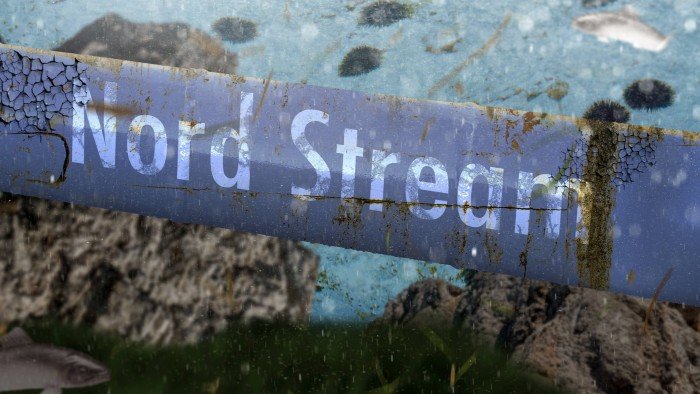Unlock the Editor’s Digest for free
Roula Khalaf, Editor of the FT, selects her favourite stories in this weekly newsletter.
Friedrich Merz’s government is examining ways to block any attempts to reactivate the Nord Stream gas pipelines linking Germany with Russia.
Berlin is considering strengthening its investment screening laws to ensure they catch any changes in ownership that could enable the pipelines to be reactivated, according to correspondence from the economy ministry.
In a written response to questions from Green MPs about the pipelines seen by the Financial Times, the ministry said it was “currently discussing whether there will be a legal amendment to investment screening”.
The pipelines, which are disabled after explosions damaged three of them in 2022, became a symbol of Berlin’s over-reliance on Moscow for energy. Germany, which in the past relied on Russia for more than 50 per cent of its gas supplies, has almost entirely weaned itself off Russian fossil fuels as Vladimir Putin’s invasion of Ukraine grinds on into its fourth year.
The German government was alarmed by reports in the Financial Times in March that Kremlin-linked Russian and US businesspeople were seeking to reactivate the pipelines, prompting Merz to start discussions with officials in Berlin and Brussels about keeping them closed.
Berlin has no state control over any of the four Nord Stream pipelines and under current legislation could do little to prevent any changes in ownership in the Swiss-based entity that owns them, according to people with knowledge of the matter.
It would be required to grant a technical certification if the pipelines were to be reactivated, but ultimately lacks the power to stop that unless the rules are changed, the people said.
The German chancellor has pushed for a ban on the pipelines as part of the EU’s upcoming round of sanctions against Russia for its war in Ukraine.
However, EU leaders failed this week to approve the new package of sanctions, because of Slovakia’s opposition.
US investor Stephen Lynch, one of those seeking to put the pipelines back in use, was invited to a meeting at the German economy ministry to discuss his plans on May 6, according to a person with direct knowledge of the talks. The meeting was first reported by Die Zeit.
Asked by Green MPs about the Lynch meeting, the economy ministry said no meeting took place at senior levels, but that officials often exchange information with institutions and individuals in relation to their areas of expertise.
Lynch believes that Europe will one day be ready to buy Russian gas again, according to a person familiar with his thinking. The US investor does not believe it would be necessary to undertake the costly work of repairing the damaged pipelines, arguing that one would be enough to meet European demand.
Lynch did not immediately respond to a request for comment from the FT.
Under German law, Berlin can block ownership changes related to non-EU investors in critical infrastructure if the transaction is deemed “a threat to Germany’s public order or security”.
Since the company operating the Nord Stream pipelines is based in Switzerland, which is part of the European Free Trade Association, a takeover would not be subject to an investment review under current rules, it said.
The Nord Stream project was launched by former chancellor Gerhard Schröder, who has close relations with Russian President Putin.
Even before Moscow started its full-scale invasion of Ukraine in 2022, the pipelines were a source of contention between Berlin and Washington, with the first Trump administration pressuring then chancellor Angela Merkel to cut her country’s reliance on Russia.
A spokesperson for Russia’s foreign minister Sergei Lavrov said on Thursday that efforts to block the pipelines resuming showed Europe’s “exasperation” at Russia’s independent policy, which he said Russia would pursue “whatever the cost.”
The recent activation plans have reignited a debate in Germany about cheap Russian gas.
Far-right Alternative for Germany wants to bring the pipelines back online, while some prominent CDU and SPD politicians have also backed such calls to alleviate higher energy prices and help Germany’s struggling industry.
However the German government told the Green MPs that it supported the EU commission’s efforts to “gradually end energy imports from Russia into the EU”.
“This will make an important contribution to increasing the EU’s energy independence and security,” it wrote. “Germany already no longer purchases Russian pipeline gas. No Russian LNG is delivered to German LNG terminals either.”
Additional reporting by Max Seddon

